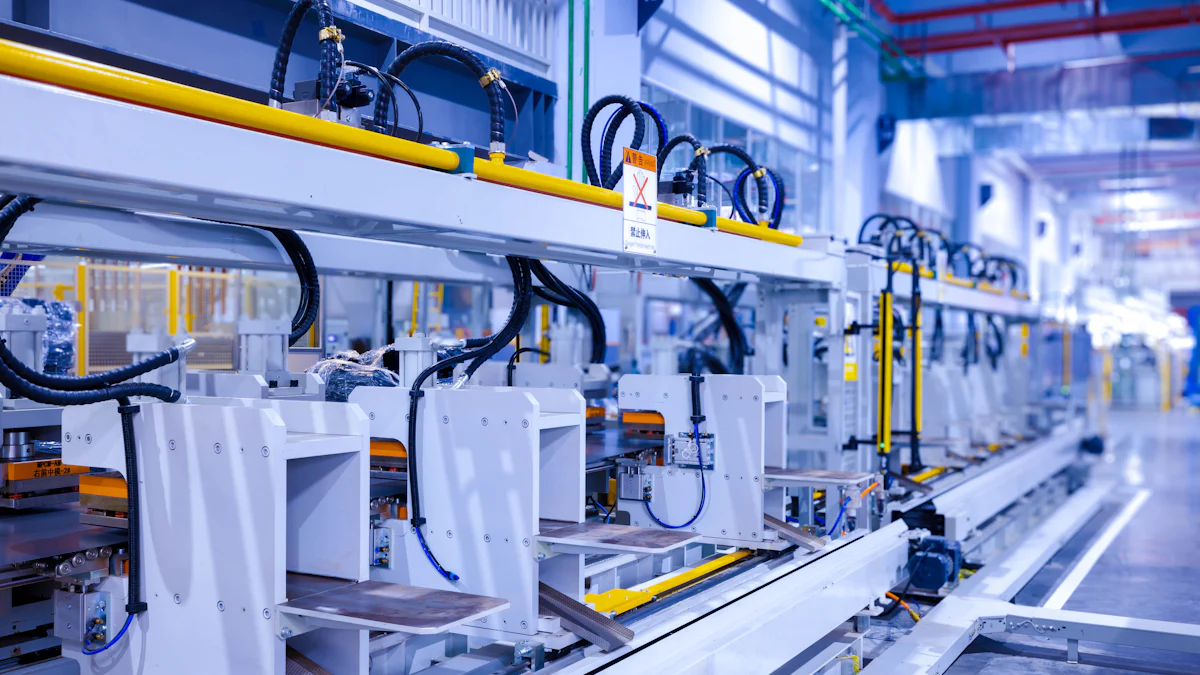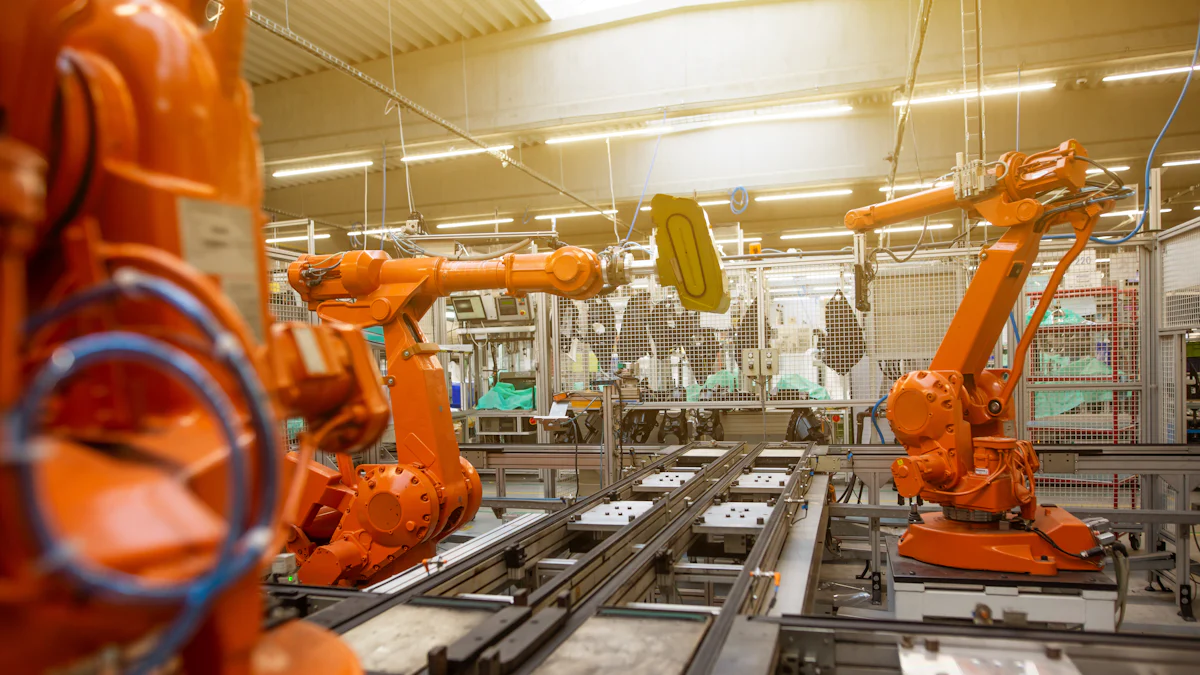Global Trends Reshaping the Manufacturing Landscape

Global industry trends significantly influence the manufacturing landscape. The sector's output grew by 3.6% in 2022, contributing 11.4% to global GDP. Projections indicate that manufacturing output will reach [$16.3 trillion]by 2023. Understanding these trends is crucial for industry stakeholders. The insights help navigate challenges and seize opportunities. Stakeholders can make informed decisions to enhance competitiveness and efficiency. The dynamic nature of these trends requires constant adaptation and strategic planning.
Digital Transformation in Manufacturing

Impact of Industry 4.0
Automation and Robotics
Industry 4.0 marks a significant shift in manufacturing through the integration of automation and robotics. Leading manufacturers invest heavily in these technologies to enhance efficiency. Automation reduces human error and increases production speed. Robotics handle repetitive tasks with precision, improving overall quality. The rise of data and connectivity further supports these advancements. Manufacturers achieve cost reductions by optimizing resource allocation. The Fourth Industrial Revolution continues to transform traditional manufacturing processes.
Internet of Things (IoT) in Manufacturing
The Internet of Things (IoT) plays a crucial role in modern manufacturing. IoT devices provide real-time data collection and analysis. This connectivity enables predictive maintenance, reducing downtime. Manufacturers gain insights into equipment performance and energy usage. IoT enhances supply chain visibility, ensuring timely deliveries. The integration of IoT fosters a more responsive and agile manufacturing environment. Companies adopting IoT benefit from increased operational efficiency and reduced costs.
Data-Driven Manufacturing
Big Data Analytics
Big data analytics revolutionizes decision-making in manufacturing. Companies utilize vast amounts of data to identify trends and patterns. This approach allows for more informed strategic planning. Analytics optimize production schedules and inventory management. Manufacturers improve product quality by analyzing customer feedback. Data-driven insights lead to enhanced competitiveness in the market. The use of big data supports continuous improvement in manufacturing processes.
Artificial Intelligence and Machine Learning
Artificial Intelligence (AI) and Machine Learning (ML) drive innovation in manufacturing. These technologies enable predictive analytics and process automation. AI systems analyze complex datasets to forecast demand and optimize supply chains. Machine learning algorithms enhance quality control by detecting defects early. Manufacturers leverage AI to develop smart factories with adaptive capabilities. The implementation of AI and ML results in increased productivity and reduced operational costs. These technologies represent the future of efficient and intelligent manufacturing.
Sustainability and Green Manufacturing

Global Industry Trends in Supply Chain Dynamics
Impact of Geopolitical Changes
Trade Policies and Tariffs
Geopolitical changes significantly influence trade policies and tariffs. These factors create new challenges for global supply chains. Companies must navigate complex regulations to maintain competitive advantage. Trade policies often result in increased costs and logistical hurdles. Businesses need to adapt strategies to mitigate these impacts. A comprehensive understanding of geopolitical dynamics is essential for effective supply chain management.
Regional Manufacturing Hubs
Regional manufacturing hubs are emerging due to geopolitical shifts. Companies are increasingly onshoring and nearshoring operations. This strategy reduces reliance on distant suppliers and enhances supply chain resilience. Regional hubs offer proximity to key markets and resources. Businesses benefit from reduced transportation costs and improved responsiveness. The development of regional hubs supports sustainable growth in the manufacturing sector.
Resilience and Risk Management
Diversification of Suppliers
Diversification of suppliers is crucial for supply chain resilience. Companies aim to reduce dependence on single sources. This approach mitigates risks associated with supply disruptions. Businesses explore alternative suppliers across different regions. Diversification enhances flexibility and ensures continuity in operations. A robust supplier network is vital for managing global industry trends effectively.
Technology in Supply Chain Management
Technology plays a pivotal role in modern supply chain management. Digital technologies improve visibility and traceability across the value chain. Data-driven inventory management optimizes supply chain efficiency. Companies leverage technology to enhance transparency and oversight. Advanced systems enable real-time monitoring and decision-making. The integration of technology fosters a more agile and responsive supply chain environment.
Future Trends and Strategic Planning
Emerging Technologies
3D Printing and Additive Manufacturing
3D printing and additive manufacturing are transforming production processes. These technologies allow manufacturers to create complex parts with precision. The reduction in material waste is a significant benefit. Manufacturers can produce prototypes quickly, accelerating innovation. Customization becomes more accessible, meeting specific consumer demands. The adoption of these technologies aligns with global industry trends emphasizing efficiency.
Blockchain in Manufacturing
Blockchain technology enhances transparency in manufacturing. This technology provides secure and immutable records of transactions. Manufacturers use blockchain to track the origin of materials. The technology ensures authenticity and compliance with standards. Blockchain reduces fraud and errors in supply chains. The integration of blockchain supports global industry trends for reliability.
Strategic Planning for Future Growth
Investment in Innovation
Investment in innovation drives growth in manufacturing. Companies allocate resources to research and development. New technologies improve product quality and reduce costs. Manufacturers adopt digital twins, machine learning, and AI. These technologies enable remote monitoring and operation. The focus on innovation aligns with global industry trends for competitiveness.
Workforce Development and Training
Workforce development is crucial for future success. Manufacturers face challenges with skilled labor shortages. Training programs equip workers with necessary skills. Employees learn to operate advanced machinery and software. Continuous education fosters adaptability in a changing landscape. Workforce development supports global industry trends for sustainability.
The manufacturing landscape undergoes significant transformation due to global industry trends. Digital transformation, sustainability, and supply chain dynamics reshape the sector. Companies must adapt to these trends for future success. Embracing change ensures competitiveness and sustainability in a dynamic environment. Technological advancements create new opportunities and solve existing challenges. Engaging the workforce through upskilling is crucial for thriving in the Fourth Industrial Revolution. Industry leaders must foster continuous learning to retain talent. A call to action encourages embracing global industry trends for growth and innovation.
See Also
5 Key Trends Shaping Future Supply Chain Efficiency
Reshaping Industries with Cloud-Based Supply Chain Solutions
Solving High-Tech Manufacturing's Supply Chain Challenges Efficiently
Key Strategies for Achieving Manufacturing Success
Trends in Robotics Technology for Sustainable Supply Chain Management
